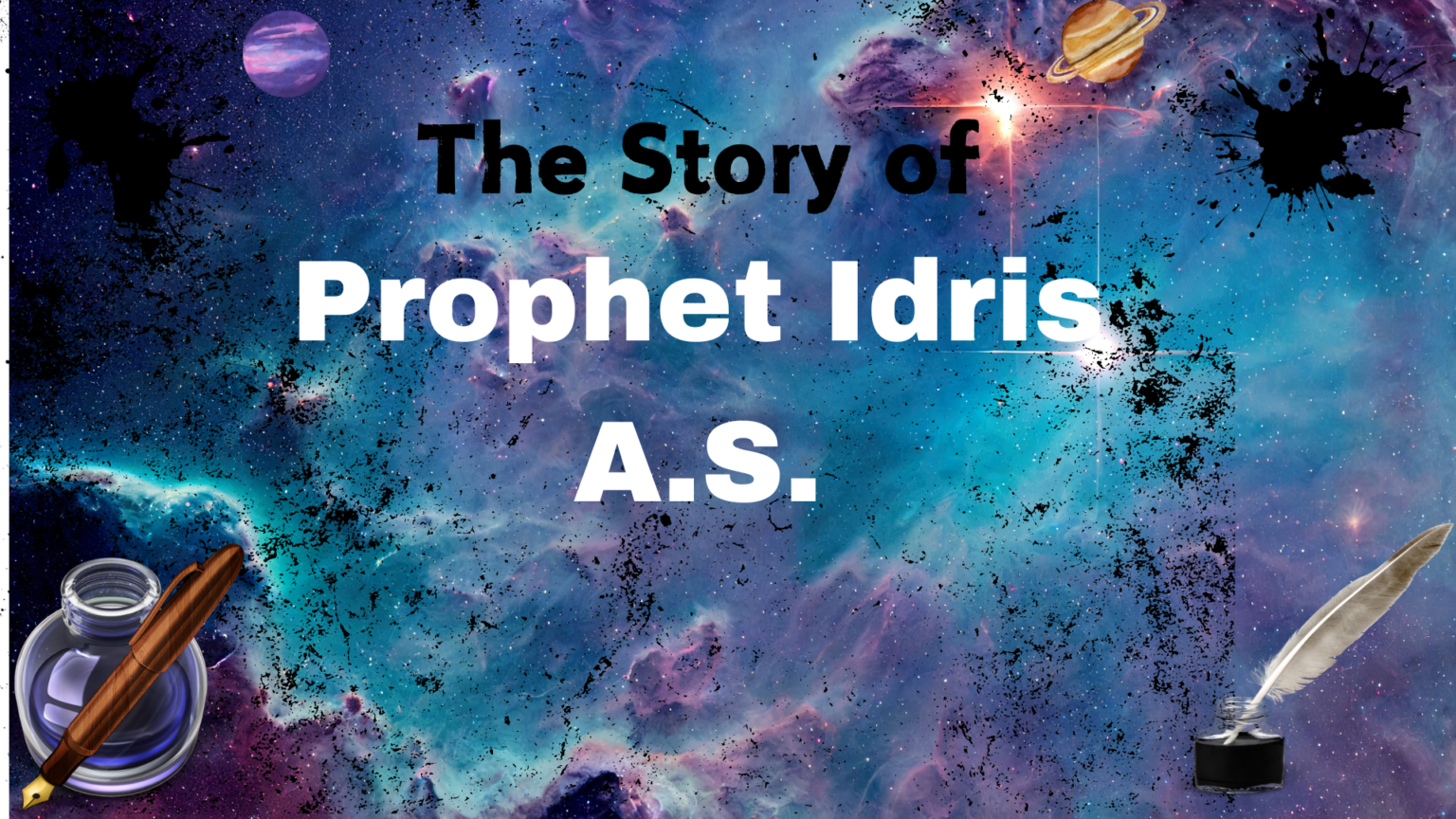
THE STORY OF PROPHET IDRIS A.S.
Prophet Idris (A.S.) is one of the prophets mentioned in the Qur’an. However, there isn’t much detailed information about his life in the Qur’an or Hadith. He is mentioned only twice in the Qur’an, and Prophet Muhammad (PBUH) spoke of meeting Idris (A.S.) in the heavens during the event of Mi’raj. In addition, other than these accounts, not much is known about him, and most of the narratives beyond this are derived from Israeli traditions. Allah has already completed the religion of Islam for us, so what He has revealed is sufficient. Matters that Allah has left unknown should not concern us. Therefore, you may choose to bypass some of the following accounts.
However, for the sake of this series, I will attempt to provide a brief account, which may include some Islamic scholarly interpretations alongside some Israeli traditions, so please be aware of this.
- The Holy Qur’an mentions Prophet Idris (A.S.) in two places:
“…And mention in the Book (the Qur’an) Idris. Verily, he was a man of truth, (and) a Prophet. And We raised him to a high station.”” — [Surah Maryam: 56-57] - And (mention) Ishmael and Idris and Dhul-Kifl; all were of the patient ones.” — [Surah Al-Anbiya: 85]
- In Sahih Bukhari, there is also a mention of Idris (A.S.) when Prophet Muhammad (PBUH) described his encounter with him during the Mi’raj (Bukhari-7362).
Scholars continue to debate whether Idris (A.S.) lived before or after Prophet Nuh (A.S.). He grew up in the city of Babel and lived for 82 years. Idris (A.S.) mastered the science of astronomy.
Narrations describe Idris (A.S.) as a well-built and handsome man with a thick beard and radiant features. His strong arms, broad chest, light build, and bright, kohl-lined eyes gave him a striking presence. People recognized him for his serious demeanor, calm speech, and his habit of pointing with his index finger when speaking, especially in moments of anger.
- It was inscribed on his cloak: Patience with faith in Allah leads to victory.
- And on his belt:
True joy lies in fulfilling the obligations and the Shariah of Allah, for the completion of religion brings the perfection of humanity. - On the cloth used for funeral prayers:
Blessed is the one who watches over himself, for his righteous deeds will intercede for him before his Lord.
Prophet Idris (A.S.) Calls His People
When Prophet Idris (A.S.) reached the age of understanding, Allah granted him prophethood. Allah commanded him to guide the wicked and corrupt people, but they refused to listen. They continued to oppose the Shariah of Adam (A.S.), although a small group accepted the faith.
Migration from Babel to Egypt
Seeing this, Idris (A.S.) chose to migrate and encouraged his followers to do the same. However, many of his followers struggled to leave their homeland of Babel, asking, “Where can we find a home as beautiful as this city?” Nevertheless, Idris (A.S.) reassured them, saying, “If you endure this hardship for the sake of Allah, His mercy will be with you, and He will reward you with something better. Therefore, do not lose heart; obey the command of Allah.”
With the believers’ consent, Idris (A.S.) and his followers migrated from Babel. Upon arrival, they reached the lush, green banks of the Nile River, rejoiced, and settled in Egypt. There, Idris (A.S.) spread Allah’s message, commanding good and forbidding evil.
Idris (A.S.) and the Languages of His Time
Historical reports state that 72 languages existed during his time, and Allah enabled Prophet Idris (A.S.) to speak all of them. He addressed each community in their own language, inviting them to Islam.
Idris (A.S.) Taught
Belief in the existence and oneness of Allah.
Worship of Allah alone.
Performing good deeds to be saved from the punishment of the Hereafter.
Detachment from worldly desires.
Upholding justice and fairness in all matters.
Sacrifices in the Name of Allah
Prophet Idris (A.S.) established several festivals for his followers, as Allah commanded. At certain times, Allah made it obligatory for them to offer sacrifices in His name. One such festival occurred when the new moon was sighted
Some of the Advices of Idris (A.S.)
- No human can fully thank Allah for His endless blessings.
- Whoever desires knowledge and righteous deeds must avoid foolish and wicked actions.
- Worldly wealth often leads to regret, and evil deeds bring only remorse.
Sincerity in worshiping Allah is essential. - Sincerity in worshiping Allah is essential.
- Never swear falsely or use Allah’s sacred name for trivial purposes.
- Stay away from lowly occupations, such as trading animals purely for profit.
- People who crave more than what is necessary for their livelihood will never feel satisfied.
Since some of these points come from Israeli traditions, we must remember the guidance of Prophet Muhammad (PBUH) regarding such narrations:
Accept any Israeli tradition that aligns with the Qur’an or Hadith.
Reject any Israeli tradition that contradicts the Qur’an or Hadith.
Narrate Israeli traditions that neither align nor contradict, but avoid making judgments about their truthfulness.
This approach ensures that Muslims focus on authentic teachings while appreciating what has been narrated about Prophet Idris (A.S.) without confusion.
Recommended: Story of Prophet Adam A.S.
Quick Summary
- Born in Babylon, Palestine.
- A 5th generation descendant of the Prophet Adam.
- Blessed with 30 revealed scriptures.
- Among the first to be granted prophethood after Adam.
- Left Babylon for Egypt with his followers to practice ‘Tawhid’.
- Spoke 72 languages.
- The first to write with a pen.
- The first to stitch clothes and make garments to wear.
- The first to formalize the knowledge of astronomy.
- Known for his many wise statements.
- During Me‘raj, the Prophet Muhammad (pbuh) met him on the 4th sky.